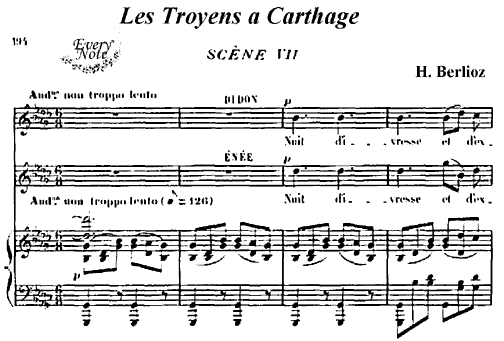Opera Daily 🎶 — Les Troyens
This week’s theme is French Opera
Today we’re listening to Shirley Verrett, and Nicolai Gedda sing the love duet, “Nuit d'ivresse et d'extase infinie”, from Act IV of Hector Berlioz’s Les Troyens. Thank you to one of our members for pointing me in this direction. We are listening to a live concert performance of this duet from Rome in 1969. Shirley Verrett is singing the role of Dido, and Nicolai Gedda is singing the role of Aeneas.
Les Troyens is epic and, for decades, was considered too challenging to perform (it’s almost six hours in length). For the premiere in Paris in 1863, the first two acts were cut, and only the second part, The Trojans in Carthage, was performed. I hesitate to introduce the opera here, given our short format, but this duet is just too perfect to not share. It’s romantic and beautiful.
🎧 Listen here (6 minute listen):
Les Troyens is the story of the fall of ancient Troy and the Trojans move from Carthage as they follow Aeneas (their leader) whose mission to found Italy is almost derailed by his love for Queen Dido. The first part of the opera is set around and inside Troy's walled city, located in Turkey, approximately 3,000 years ago. The second part takes place several months later, in the North African city of Carthage.
Act IV ends with this duet between Aeneas and Dido where they finally admit their love. The lines Berlioz uses in this duet are based on Shakespeare's Merchant of Venice (“On such a night ...”).
Want more?
Composed in 1858, the libretto of the opera was written by Berlioz himself and it was based on Virgil’s poem, “The Aeneid.”
One of the most famous of the French grand operas, Les Troyens is a perfect example of this genre of 19th-century opera, which is characterized by large-scale casts and orchestras, lavish design, and stage effects, big choruses, ballets, and length. These operas were long.
Les Troyens is one of the few operas in which a singer can perform more than one major role. The opera premiered at the Metropolitan Opera in 1973, with Jon Vickers as Aeneas and Shirley Verrett singing both Cassandra and Dido. If you want to learn more about Shirley Verrett and her journey from mezzo-soprano to soprano, there’s more here.
Thank you for listening,
Michele
🧡 If you enjoyed this post, hit the heart to like it. It helps others find Opera Daily.




Berlioz is grateful too. Every night Berlioz' Father read him the AENEID as a bedtime story which became part of his artistry as a composer. It was never heard complete in Paris in his lifetime and for 90 years until the Royal Opera House did it in the 1950's with brutal cuts. LES TROYENS was vilified by critics for almost a century and one remarked that Berlioz was buried under the Wall of Troy. Nonetheless, you work here is extremely important for LES TROYENS and Berlioz in Century 21.
Opera Daily's format is perfect for my shortened attention span and the times we live in. The information presented is just enough to savor, without getting satiated. Even so, comments here and on YouTube often point me in new directions. Now I'm eager to hear Shirley Verrett and Claudio Abbado in Verdi's "Macbeth". I'm also interested in the great opera houses, having been to only three of them. I also think about opera singers who have achieved fame and fortune. It can't be talent alone. I wonder about the mix of variables that create celebrity (such as location, training, patrons, publicity, connections, critics, physical attributes and probably race and class). I have some mild regret about not cracking open that big history of opera book that languished at home for years. At least it is now in the hands of my sister, a trained classical though not a professional, singer and a true aficionado. Me, I'm grateful for the time to explore what I used to ignore. Onward!